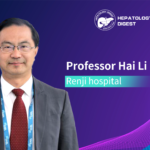
The 29th Annual Meeting of the European Hematology Association (EHA 2024) will be grandly held in Madrid, Spain, from June 13 to 16, 2024! As an international event in the field of hematology, EHA 2024 gathers top hematology experts worldwide to share and discuss the latest research findings in hematology. This issue features a research report from Director Shuangyou Liu’s team at Beijing Gaobo Boren Hospital, detailing the five-year follow-up results of CD19 and CD22 CAR-T combined therapy for relapsed acute B-lymphoblastic leukemia (B-ALL) post-allogeneic hematopoietic stem cell transplantation.Abstract Number: P429
Title: Five-year outcome of CD19 combined with CD22 CAR-T cell therapy in B-ALL patients relapsed after allo-transplantation
Research Background
We previously reported a phase I clinical trial of CD19 and CD22 specific chimeric antigen receptor (CAR) T-cell combined therapy for relapsed acute B-lymphoblastic leukemia (B-ALL) post-transplantation. In this trial, which included both pediatric and adult patients, the complete remission (CR) rate after the first CD19 CAR-T treatment was 85% (23/27). Subsequently, 21 patients received follow-up CD22 CAR-T cell therapy (6 did not receive the second cell therapy), with 18-month overall survival (OS) and event-free survival (EFS) rates of 88.5% and 67.5%, respectively. Here, we present the long-term survival outcomes of these patients.
Research Objectives
To observe the long-term efficacy of CD19 and CD22 CAR-T combined therapy in B-ALL patients relapsed after allogeneic hematopoietic stem cell transplantation (allo-HCT).
Research Methods
In addition to the previously reported 27 patients, this follow-up study included another 3 patients who only experienced bone marrow minimal residual disease (MRD) relapse. These patients did not meet the enrollment criteria but were treated with CD19 and CD22 CAR-T cells under the same protocol. CAR-T cells were prepared using lentiviral vectors encoding second-generation CARs containing CD3ζ and 4-1BB. The initial cell infusions occurred between December 2017 and October 2019, with the last follow-up date being December 31, 2023.
Research Results
The 3 MRD relapse cases achieved MRD-negative CR after the initial CD19 CAR-T therapy. Among the 24 patients who completed CD19 and CD22 CAR-T therapy, with a median follow-up of 64.4 months (range: 9.2–71.7 months), 12 patients relapsed, including 3 (3/12, 25%) late relapses (more than 2 years after the first CD19 CAR-T cell infusion). Among these relapsed patients, 6 died from disease progression, and 6 survived after receiving other treatments (4 underwent a second allo-HCT). Encouragingly, the remaining 12 patients have remained in continuous remission since their first CD19 CAR-T (11 patients) or second CD22 CAR-T (1 patient with extramedullary disease achieving partial remission after CD19 CAR-T) therapy. Kaplan-Meier survival analysis showed 3-year OS and EFS rates of 79% and 54%, respectively, and 5-year OS and EFS rates of 75% and 50%.
Among all 30 intention-to-treat patients (including the 6 who did not receive the second CD22 CAR-T cell therapy), the 3-year OS and EFS rates were 70% and 50%, respectively, and the 5-year OS and EFS rates were 67% and 46%.
For patients who achieved CR/PR with incomplete blood count recovery by day 30 post-infusion, blood counts recovered within 7 months. There were 13 severe (≥ grade 3) infections within 2 years post-CAR-T infusion, including 11 pulmonary infections (10 grade 3, 1 grade 4) and 2 skin varicella-zoster virus infections (grade 3).
Research Conclusion
For B-ALL patients with poor prognosis relapsed after allo-HCT, CD19 and CD22 CAR-T cell combined therapy significantly improved long-term survival rates, achieving 5-year OS and EFS rates of 75% and 50%, respectively.


